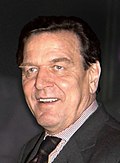1986 Lower Saxony state election
| ||||||||||||||||||||||||||||||||||||||||||||||||||||||||
All 155 seats in the Landtag of Lower Saxony 78 seats needed for a majority | ||||||||||||||||||||||||||||||||||||||||||||||||||||||||
|---|---|---|---|---|---|---|---|---|---|---|---|---|---|---|---|---|---|---|---|---|---|---|---|---|---|---|---|---|---|---|---|---|---|---|---|---|---|---|---|---|---|---|---|---|---|---|---|---|---|---|---|---|---|---|---|---|
| Turnout | 4,320,347 (77.3%) | |||||||||||||||||||||||||||||||||||||||||||||||||||||||
| ||||||||||||||||||||||||||||||||||||||||||||||||||||||||
 Results for the single-member constituencies | ||||||||||||||||||||||||||||||||||||||||||||||||||||||||
| ||||||||||||||||||||||||||||||||||||||||||||||||||||||||
The 1986 Lower Saxony state election was held on 15 June 1986 to elect the members of the 11th Landtag of Lower Saxony.[1] The election result was reportedly affected by the Chernobyl disaster which happened two weeks earlier.[2]
Background
In the 1982 state elections, the Christian Democratic Union (CDU) under Minister-President of Lower Saxony Ernst Albrecht achieved its best result ever in Lower Saxony with 50.7 percent of the vote, while the Social Democratic Party (SPD) under Karl Ravens suffered heavy losses.[3]
Since this was already Ravens' second loss against Albrecht, he decided not to run as a candidate again in 1986.
When the SPD was looking for a candidate, the SPD leadership originally favoured former Federal Minister Anke Fuchs. However, after the former Federal Chairman of the Juso and then-Hanoverian MP Gerhard Schröder announced his candidacy and secured the support of several SPD district associations, Fuchs gave up being top candidate.
There were some disputes within the SPD over the coalition question: While chancellor candidate Johannes Rau had ruled out a coalition with the Greens for the federal election planned for January 1987 and was counting on the SPD having its own majority, Schröder did not want to rule out a red-green coalition in general.
The disputes between Rau and Schröder on this issue were one of the election campaign issues.
Parties and candidates
The state electoral committee approved 706 candidates (567 men and 139 women). The 623 district nominations consisted of 508 men and 115 women from 10 parties and individual candidates, the 389 state nominations consisted of 309 men and 80 women. Of these, 306 (56 women) also ran for a district nomination.
| No. | Party/individual candidate | Number of constituency candidates |
|---|---|---|
| 1 | Christian Democratic Union of Germany | 100 |
| 2 | Social Democratic Party of Germany | 100 |
| 3 | DIE GRÜNEN | 100 |
| 4 | Free Democratic Party | 100 |
| 4 | Patriots for Germany | 100 |
| 5 | German Communist Party | 84 |
| 7 | The Whites | 32 |
| 8 | Citizens' Party | 1 |
| 9 | German Solidarity | 1 |
| 10 | Young Voters Association of Lower Saxony | 1 |
| 11 | Independents | 4 |
| total number of approved district election proposals | 623 | |
Results
While the CDU lost its absolute majority, the SPD again exceeded the 40 percent mark thanks to significant gains. In addition, around a third of the CDU's direct mandates went to the SPD. The Greens and the FDP only recorded minimal gains. Even though there was renewed circulation of candidacies from the other parties and some new parties were eligible, the small parties again received less than one percent of the votes together. The DKP's votes also halved compared to the last election.
 | ||||||
|---|---|---|---|---|---|---|
| Party | Votes | % | +/– | Seats | +/– | |
| Christian Democratic Union | 1,903,559 | 44.34 | −6.35 | 69 | −18 | |
| Social Democratic Party | 1,807,157 | 42.09 | +5.56 | 66 | +3 | |
| The Greens | 303,308 | 7.06 | +0.52 | 11 | 0 | |
| Free Democratic Party | 257,873 | 6.01 | +0.10 | 9 | −1 | |
| Patriots for Germany | 11,284 | 0.26 | New | 0 | New | |
| German Communist Party | 5,690 | 0.13 | −0.15 | 0 | 0 | |
| The Whites | 3,858 | 0.09 | New | 0 | New | |
| Citizens' Party | 198 | 0.00 | +0.00 | 0 | 0 | |
| German Solidarity | 38 | 0.00 | New | 0 | New | |
| Young Voters Association | 17 | 0.00 | New | 0 | New | |
| Independents | 164 | 0.00 | +0.00 | 0 | 0 | |
| Total | 4,293,146 | 100.00 | – | 155 | −16 | |
| Valid votes | 4,293,146 | 99.37 | ||||
| Invalid/blank votes | 27,201 | 0.63 | ||||
| Total votes | 4,320,347 | 100.00 | ||||
| Registered voters/turnout | 5,588,597 | 77.31 | ||||
Formation of a government
The CDU formed a coalition with the FDP, which had a majority of one vote. Albrecht was then confirmed as Minister President. Schröder resigned from his Bundestag mandate and moved into state politics as SPD parliamentary group leader and opposition leader.
In December 1988, a constructive vote of no confidence against Albrecht, brought by the SPD parliamentary group because of the casino affair, failed by 76 votes to 79. At least one member of the opposition parties SPD and Greens must have voted for Albrecht.
See also
Further reading
- Forschungsgruppe Wahlen: Wahl in Niedersachsen. Eine Analyse der Landtagswahl am 15. Juni 1986. Mannheim 1986.
- Institut für angewandte Sozialwissenschaft (Hg.): Niedersachsen 1990. Landtagswahl am 15. Juni 1986; Analysen und Dokumente, Bad Godesberg 1986.
- Claus A. Fischer (Hrsg.): Wahlhandbuch für die Bundesrepublik Deutschland. Daten zu Bundestags-, Landtags- und Europawahlen in der Bundesrepublik Deutschland, in den Ländern und in den Kreisen 1946–1989, 2. Halbband, Paderborn 1990.
External links
References
- ^ "Landtagswahl in Niedersachsen 1986". www.da-ra.de. Retrieved 2024-10-18.
- ^ "Chernobyl's political fallout". Washington Post. June 17, 1986.
- ^ "Former German politician, Ernst Albrecht, dies – DW – 12/13/2014". dw.com. Retrieved 2024-10-18.


